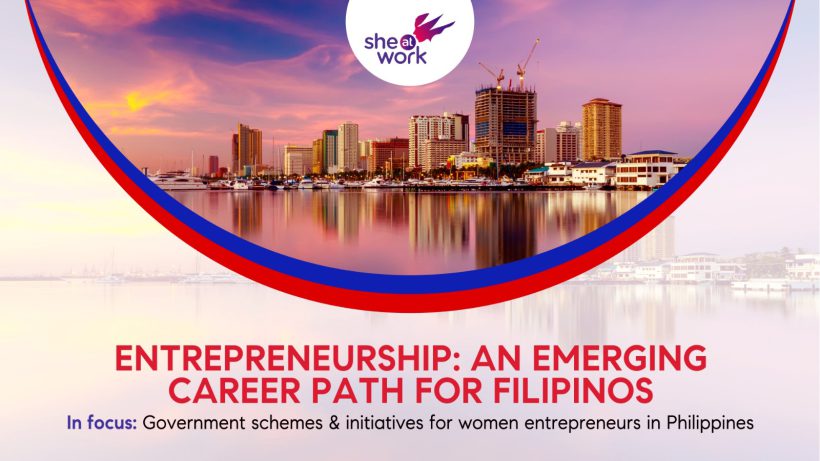In focus: Government schemes & initiatives for women entrepreneurs in Philippines
What is encouraging is that Philippines is seen as an entrepreneurial country. Here exists small and medium-sized enterprises (SMEs), including micro-enterprises, which account for 99 percent of all business establishments and 60 percent of the exporting firms in the Philippines. According to the Department of Trade and Industry, currently, “SMEs employ about 55 percent of the Philippine labour force and contribute 30 percent to total domestic sales volume”.
Entrepreneurship is an emerging career path for Filipinos. In the Philippines; 6.2% of the adult population appear to be established business owners and 18.4% are engaged in early-stage entrepreneurship.
However, among existing problems that Filipino entrepreneurs face are – inadequate access to technology, financing capital, marketing advice and logistical problems in setting up and maintaining their competitiveness in their community. Interestingly, it is for this reason, the Philippine government has identified the need to foster entrepreneurial spirit to give a push to the slow economy.
Here are some schemes and initiatives for women entrepreneurs in Philippines.
> The Philippine Commission on Women (PCW)
The Philippine Commission (PCW) on Women is a leading Philippine government agency steering development efforts towards both women’s empowerment & gender equality. Its mission is significant – to partner with key stakeholders to make government work for the promotion and fulfilment of women’s human rights – to enable women and men to equally contribute to and benefit from development, through gender mainstreaming in plans, policies, programs and services.
To address women’s economic empowerment, the PCW has been the leading agency of the Gender Responsive Economic Actions for the Transformation of Women (GREAT Women) Project. The GREAT Women Project is a governance and capacity development project that aims to promote and support a gender-responsive enabling environment for women’s economic empowerment – particularly those in microenterprise.
Through the GWP, PCW builds capacities of national government agencies and local government units to enable Filipino women microentrepreneurs – to access information, credit, loans or financial assistance, training, markets technology and social protection. https://www.women.apec.org/philippines.php
> Magna Carta of Women
The Magna Carta of Women or Republic Act 9710 is a comprehensive human rights law that promotes – women empowerment, calls for equal opportunities for women and men, and ensures equal access to resources and to development results and outcome in the Philippines. In 2009, when it was enacted by the Philippine Senate and the House of Representatives, and many viewed it as a victorious move, for it was the signing of a law that seeks to eliminate discrimination by recognizing, protecting, fulfilling and promoting women’s rights.
After RA 9710 was passed, it presented the perfect opportunity for the Philippine Commission on Women (PCW) to reveal what steps the Philippines have taken, to further empower women and protect women’s rights, and is it truly moving forward?https://investinginwomen.asia/posts/tenth-anniversary-magna-carta-women-progress-
bpfa25/
> The Women and Entrepreneurship report
The Women and Entrepreneurship report examines the state of small to medium enterprises (SMEs) in the Philippines, and the contribution that women-owned businesses make to the Philippine economy.
The report gives an overview of the definitions of the different types of enterprises according to Philippine regulation, and the different classifications of ‘small’ and ‘medium’ enterprises based on the total value assets of the business, as well as the total number of employees. Interestingly, these small to medium enterprises are viewed as significant contributors to employment and economic growth, and are associated with the formalization of a country’s economy.
https://investinginwomen.asia/knowledge/university-sydney-july-2017-women-
entrepreneurship-philippines/
> ICMA – SURGE project
Through funding from the U.S. Agency for International Development (USAID), ICMA implemented the SURGE Project in Philippine – to improve local capacity in inclusive and resilient urban development, improve local economic development & expand economic connectivity and access between urban and rural areas.
The global unprecedented COVID-19 pandemic did slow down economic growth all over the world, even crippling business operations, tourism profits, and consumer spending. Businesses closed, employers let go of some or all of their workers, and entrepreneurs had to come up with innovative ways to stay afloat. In Cagayan de Oro City, in the Northern Mindanao region of the Philippines, an initial report showed that the services sector—particularly wholesale, retail, and tourism-related businesses, are among the sectors hit hardest as a result of being categorized as nonessential production activities.
https://icma.org/articles/pm-magazine/helping-women-entrepreneurs-philippine-city-
cagayan-de-oro
> WE Rise Accelerator 2022
WE Rise Accelerator 2022 is a 6-month program for women entrepreneurs in the Philippines – to become investment-ready and access financing through hands-on learning activities, customized mentorship, and tailored leadership coaching. The program supports 10 amazing women-led enterprises by providing them with extensive and personalized support to grow their business – like to strengthen their business models, firm up their financial systems, and guide them in scaling their business and accessing the right capital for growth.
The WE Rise Accelerator 2022 is exclusively developed by Villgro Philippines in partnership with The Sasakawa Peace Foundation.
https://villgrophilippines.org/werise/
> USAID partners with the Philippine government & private sector to help Filipino entrepreneurs boost their businesses
The U.S. government, through the United States Agency for International Development (USAID), has forged a new partnership with the Department of Trade and Industry (DTI), National Confederation of Cooperatives (NATCCO), and the Philippine private sector – to empower Filipino entrepreneurs.
Together with Facebook, Shopee, and Lazada, USAID’s “Connecting Women Entrepreneurs to the Digital Economy” initiative enhances entrepreneurs’ access to markets by equipping them with knowledge and tools to become effective online sellers.
This partnership, as part of the U.S. government’s Women’s Global Development and Prosperity Initiative, aims to increase women entrepreneurs’ access to financing, market opportunities, and training to establish and grow their businesses.
https://2017-2020.usaid.gov/philippines/press-releases/sep-18-2020-usaid-partners-
philippine-government-and-private-sector-help-filipina-entrepreneurs-boost-businesses
> SheTrades PH Hub
Women-owned businesses in the Philippines can look forward to connecting to international markets through SheTrades PH Hub, launched at the annual Philippines National Export Congress on 3 December 2020.
The SheTrades Philippines Hub, was launched by the Department of Trade and Industry-Export Marketing Bureau (DTI-EMB) and the International Trade Centre (ITC). The hub is part of ITC’s SheTrades initiative, to connect women entrepreneurs around the world to international markets. Hosted by the DTI-EMB, the hub roll-outed the global SheTrades initiative in the local context by aligning it with government initiatives on women’s economic empowerment for increased local ownership and sustainable long-term impact.
https://intracen.org/news-and-events/news/philippines-to-bolster-women-entrepreneurs-
with-launch-of-national-shetrade










